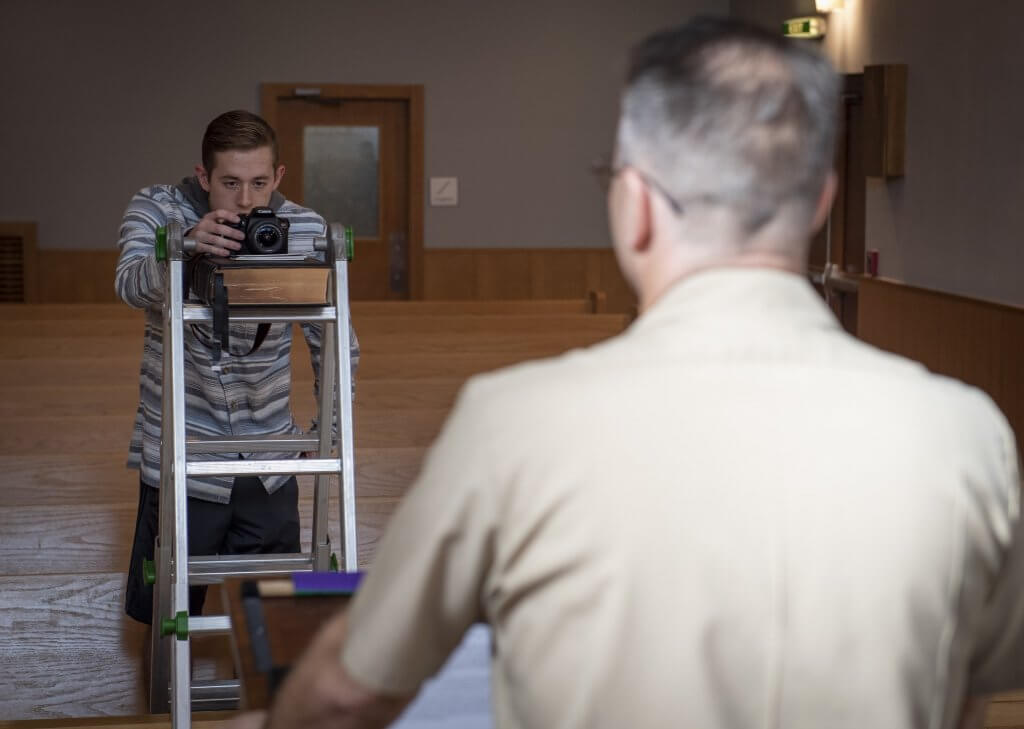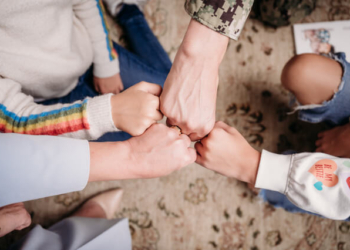The coronavirus outbreak in Italy has forced its government to place the entire country on lockdown, placing over 60 million people in quarantine. The U.S. military bases in Italy have followed the host nation’s new rules, doing their best to help contain and prevent the spread of the novel virus to military members and families.
While many people in Italy have struggled to adapt to this new normal with its many restrictions, one Navy family of three attached to the U.S. Naval Forces Africa’s headquarters in Naples, Italy, felt more than well prepared to hunker down. After all, they lived through the Ebola outbreak when stationed in Nigeria in 2014.
Seeing it all

Julie Tully’s husband is a Foreign Area Officer who specializes in Africa and, like most military families, they have traveled frequently, spending close to eight years in Africa before being stationed in Naples in 2018
During their many moves, the Tully family has seen their share of epidemics and disease outbreaks, to say the least.
“We lived in England at the tail end of their bovine spongiform encephalopathy (a.k.a. Mad Cow) scare,” Tully said. “We lived in Cameroon during an outbreak of cholera, and in Nigeria during the Ebola outbreak and Boko Haram attacks.”
Facing Ebola in Nigeria
The family was stationed in Abuja, Nigeria, from 2013 to 2015.
“We loved living in Africa,” Tully said. “Having been stationed in neighboring Cameroon the tour before, we eagerly took the opportunity to live and work in Nigeria, a country we found fascinating.”
However, they soon had to face the threatening spread of Ebola, which quickly reached Lagos, a city in Nigeria. Although Lagos was far away from Abuja, the country — and the Tully family — had to quickly take precautions to reduce and prevent the spread.
According to Tully, those precautions were “eerily similar to what we are seeing in Italy now. Our schools closed, public gatherings were banned, hand washing was encouraged, and people kept safe distances from each other.”

One thing Italian people have had a hard time adjusting to is modifying their traditional greeting, which consists of shaking hands, hugging, and kissing each other’s cheeks twice — a tradition that certainly doesn’t help prevent coronavirus from spreading.
“The funny thing is, watching the news now with people reacting to the novelty of alternative greetings like the elbow bump and the namaste bows, well, those aren’t so new,” Tully said. “We were doing them in 2014 in Nigeria . . . to also include the not so popular booty bump!”
Getting ready for coronavirus

“When the first cases began to appear in the north of Italy, we had a feeling that it would only be a matter of time before the virus made its way south.” Tully explained. Old habits quickly set in for this family’s household, as they got ready for what they knew was coming.
They shopped for soap, pantry staples and other supplies they knew they would need regularly as they prepared to spend weeks at home. Tully’s teenage son knew his school lessons were more than likely going to switch from the classroom to online, something he had already experienced in Nigeria.
They also made sure to have plenty of ways to spend quality time with each other while in quarantine.
“One thing we learned in Africa and during the Ebola crisis in Nigeria is that your house is your quality of life,” she said. “So you better make sure it’s a place you and your family want to be.”
Suggestions for military families in the U.S.
Now that the U.S. is taking many of the same precautions that Italy has in their fight against the spread of coronavirus, the Tully family has a few suggestions on how to approach the many restrictions that military families — as well as civilians — are facing: “Don’t panic, don’t stress, and remember to enjoy the simple things in life.”
And since Italians have found a solution to their lack of social life by playing instruments, singing and dancing outside on their balconies, perhaps people in the U.S. could also dust off their guitars and practice tickling the ivories to boost morale during quarantine. After all, as Italians are reminding one another, Andrà tutto bene, everything will be alright.
Read comments






































